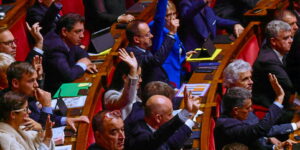More than 750 writers, more than 2,000 publishers and almost a million visitors make the Guadalajara International Book Fair (FIL), Mexico, the heart of world literature. A heart that, from November 29th to December 7th, will beat driven by the strength of Barcelona. The city, guest of honor of the 2025 edition of the fair, has prepared an exceptional exhibition with 60 emblematic authors such as Eduardo Mendoza and Javier Cercas, as well as an extensive program of activities to showcase its creative and cultural richness in this extraordinary context.
Having inspired Marsé and Vila-Matas and welcomed García Márquez; celebrate an emblematic festival like Sant Jordi and even have what has been named the best public library in the world in 2024. All these reasons explain the Catalan capital’s leading role in the FIL and its status as a UNESCO City of Literature, a distinction it has held for a decade. But there’s more. Beyond the big names, awards and recognitions, its position as a center of culture and exchange of ideas is the result of a conscious strategy and constant effort by the City of Barcelona, in collaboration with other agents and institutions based in Barcelona.
The impact, diversity and vigor of Barcelona’s different literary festivals are a good example of this. Kosmopolis, one of the major annual events inaugurated in 2002, was attended by international stars such as Art Spiegelman, Salman Rushdie and Ryszard Kapuscinski, among many others. Without forgetting the importance of BCNegra, Barcelona Poetry, Festival 42, Món Llibre, Liternatura… and a program of high-intensity literary events that take place throughout the year in bookshops, writing schools, writers’ associations and libraries.
The promotion of reading has long been a fundamental pillar of the city’s cultural policy, as demonstrated by the organization of meetings between authors and readers and the constant support for the publishing sector. The collaboration takes shape in La Setmana del Llibre en Català, Sant Jordi, Artslibris, Literal o Fira del Llibre d’Ocasió Antic i Modern, and also in the editorial and co-publishing activities of Barcelona Llibres
Public libraries, in fact, are a key space in this entire ecosystem. What future does a literary capital have without readers? In the Master Plan 2030 of the Barcelona Library, for example, emphasis is placed on the right to read, write and speak in public. And, in fact, the promotion of reading has long been a fundamental pillar of the city’s cultural policy, as demonstrated by the organization of meetings between authors and readers and the constant support for the publishing sector. A collaboration that takes shape in La Setmana del Llibre en Català, Sant Jordi, Artslibris, Literal or in the Fira del Llibre d’Ocasió Antic i Modern, and also in the editorial and co-publishing activities of Barcelona Llibres.
In this literary Barcelona, obviously, writers could not be missing. They are the ones who fuel the narrative of the city, who define it and imagine its future, who, ultimately, make it modern and current. For this reason, several scholarships have been launched in recent years for creators and other agents in the book sector, such as the Barcelona Crea, Montserrat Roig and Carme Montoriol scholarships. And for this same reason, initiatives have been carried out such as the installation of literary plaques in the streets or the creation of a literary map of the city, which will be presented at the FIL and which connects the careers of famous writers such as George Orwell or Roberto Bolaño with the spaces of the city.
The representatives who participate will also promote the Barcelona brand and work to reach agreements and agreements with various economic, cultural and scientific actors related to innovation and knowledge in Mexico.
It is clear, therefore, that literature in particular and culture in general occupy a priority place among the values that Barcelona wants to project internationally, and specifically in the FIL. In any case, the city’s presence at the fair – which involved a notable effort in translating the books from Catalan into Spanish – goes far beyond literature. The representatives who participate will also promote the Barcelona brand and work to reach agreements and agreements with various economic, cultural and scientific actors related to innovation and knowledge in Mexico.
Indeed, the next edition of the Barcelona Business Bridge – a series of initiatives, in collaboration with the Barcelona Chamber of Commerce, to position the city as an economic and entrepreneurial environment, destination for international investments and talent – will take place in Guadalajara and Mexico City on the same dates as the FIL. There is no doubt, therefore, that this opportunity to showcase cultural excellence will also be a great opportunity to strengthen the economic, cultural and institutional ties between the two cities and their territories.




